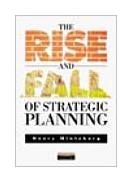|
||
• wydawnictwa polskie
• Zamów informacje o nowościach z wybranego tematu • kontakt
• Cookies na stronie |
RISE AND FALL OF STRATEGY PLANNINGMINTZBERG H.wydawnictwo: FT/PH , rok wydania 2000, wydanie Icena netto: "My favourite management book of the last 25 years? No contest. The Rise & Fall of Strategic Planning by Henry Mintzberg." Tom Peters In this definitive and revealing history, Henry Mintzberg unmasks the process that has mesmerised so many organisations since 1965: strategic planning. Table of Contents Acknowlegdements xv A Note to the Reader xvii Introduction: The "Planning School" in Context 1 Planning and Strategy Why plan (According to
Planners)? And what is Strategy? Planners, Plans and Planning A Plan for this book 2.Models of the Strategic Planning Process The Basic Planning Model The core 'design school' model Premises of the Design School Premises of the Planning Literature The Initial Ansoff Model The Mainline Stiener Model Decomposing the Basic Model The Objective Setting Stage The External Audit Stage The Internal Audit Stage The Strategy Evaluation Stage The Strategy Operationalization Stage Scheduling the Whole Process A Missing Detail Sorting out the Four Hierarchies: Objectives, Budgets, Strategies, Programs Heirarchy of Objectives Heirarchy of Budgets Heirarchy of Strategies Heirarchy of Programs The "Great Divide" of Planning Forms of Strategic Planning A.Conventional Strategic Planning B."Strategic Planning" as numbers game C.Capital Budgeting as Ad Hoc Control 3. Evidence on Planning Survey Evidence on "Does Planning pay?" Anecdotal Evidence The Generic Electric FIFO Experience Some Deeper Evidence Sarrazin's Study of Exemplary Planning Gomer's Study of Planning Under Crisis Quinns findings on Planning Under "Logical Incrementalism" The McGill Research on "Tracking Strategies" Koch's study of the "Facade" of French Government Planning Some Evidence on the PPBS Experience Some Evidence on Capital Budgeting Concluding the Deeper Evidence Planners' Responses to the Evidence Faith "There is no problem" Salvation "Its the process that counts" Elaboration "Just you wait" Reversion "back to basics" Pitfalls "Them not us" 4. Some Real Pitfalls of Planning Planning and commitment Commitment at the Top Commitment Lower Down "Decentralized" Planning Planning And Freedom Commitment Versus Calculation Planning And Change The Inflexibility of Plans The Inflexibility of Planning Planned Change as Incremental Planned Change as Generic Planned Change as Short Term Flexible Planning: Wanting Things Both Ways Planning & Politics The Bases of Objectivity The Goals Implicit in Planning The Politics of Planning Politics over Planning Planning and Control Obsession with Control "Our Age is turbulent, Chicken Little" Strategic Vision and Strategic Learning Illusion of Control? Planning as Public Relations 5.Fundamental Fallacies of Strategic Planning Some Basic Assumptions Behind Strategic Planning Missing Taylor's Message The Fallacy of Predetermination The Performance of Forecasting The Forecasting of Discontinuities Forecasting as Magic Forecasting as Extrapolation Forecasting and "Turbulence" 237 The Dynamics of Strategy Formation Forecasting as Control (and Planning as Enactment) Secenarios's Instead of Forecasts Contingency Planning instead of Deterministic Planning The Fallacy Detachment Seeing the Forest and The Trees The Soft Underbelly of Hard Data The Detachment of Planners from Strategy Making The Detachment of Managers who Rely on Planning from Strategy Making Learning about Strengths and Weaknesses "Marketing Myopia" Myopia Attaching Formulation to Implementation Connecting Thinking and Acting The Fallacy of Formulation The Failure of Formalization Was Formalization ever tried? The Analytical Nature of Planning Intuition Distinguished Do the Hemispheres Have Minds of Their Own? Simon's Analytical View of Intuition Flipping Intuition Across Analysis Planning on the Left Side and Managing on the Right The Image of Managing The Grand Fallacy 6. Planning, Plan, Planners Coupling Analysis and Intuition The Planning Dilemma Comparing Analysis and Intuition Analysis and Intuition in Strategy Making "Soft" Analysis Role of Planning: Strategic Programming Step 1: Codifying the Strategy Step 2: Elaborating the Strategy Step 3: Converting the Elaborated Strategy Conditions of Strategic Programming First Role of Plans: Communication Media Second Role of Plans: Control Devices Strategic Control First Role of Planners: Finders of Strategy Logic in Action Desperately Seeking Strategies Unconventional Planners Second Role of Planners: Analysts Strategic Analysis for Managers External Strategic Analysis Internal Strategic Analysis and the role of Simulation Scrutinization of Strategies Third Role of Planners: Catalysts Opening Up Strategic Thinking Role for Formalization The Formalization Edge Simon's Interactive Control Playing the Catalyst Role The Planner as Strategist A Plan for Planners A Planner for Each Side of the Brain Planners in Context Forms of Organizations Strategic Programming in the Machine Organization Right and Left Handed Planners in the Machine Organization Strategic Programming Under Other Conditions Strategic Analysis in the Professional Organization Planning & Analysis in the Adhocracy Organization Minimal Roles in the Entrepreneurial Organization Performance Control in the Diversified Organization Planning Under Politics and Culture Planning in Different Cultures 458 pages Księgarnia nie działa. Nie odpowiadamy na pytania i nie realizujemy zamówien. Do odwolania !. |


